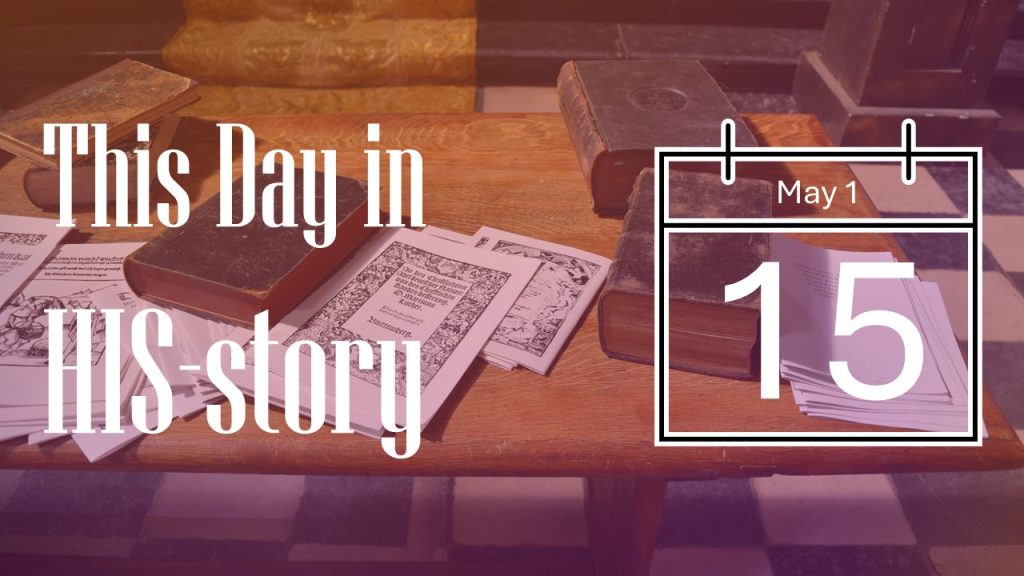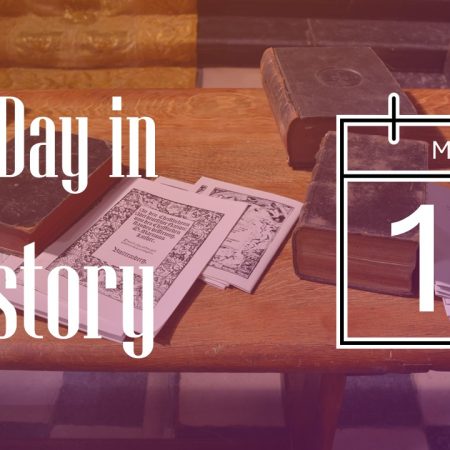
1556
John Knox’s Vision for Reformation
When Knox first preached, his sermons consisted largely of fulminations against Roman Catholic practices. They gave his listeners something to protest against, but nothing to put in place of that which they were asked to discard. In 1556, after a visit to Geneva, Knox began to preach a new kind of sermon, a sermon in which he not only tore down the old but showed his listeners that as God’s elect they must build a new kind of church in place of that which they removed.

Many nobles came to hear him speak of the new nation he envisioned, a nation in which the true Kirk (church), with Christ at its head, would triumph. The bishops of the old order trembled. Should Knox have his way– and his growing popularity indicated he might–they would be robbed of their authority. Typical of the opposition he faced was their summons to appear at the Church of the Blackfriars in Edinburgh and face legal proceedings. He appeared in Edinburgh on this day May 15, 1556.
Turning the Tables
Perhaps the bishops had hoped to humble him. Instead he turned the tables. Many men of high standing, including the noble William Keith, the Earl Marischal, appeared with him. Regent Mary of Guise (mother of Mary, Queen of Scots) dismissed the summons, and Knox went on to preach to large crowds in Edinburgh. He also wrote her a letter of thanks, asking for toleration of all Protestants. She treated it with contempt.
But Scotland was not yet ready for the Knox brand of reform. The nobles wanted to revive feudalism; the government’s advisors sought to put down the Scots with a mercenary army. Once again John Knox left for Geneva where he ministered to fellow exiles. In Geneva he embarrassed Calvin by issuing over the Reformer’s objections a notorious “blast” against women rulers. When reform-minded Elizabeth came to the throne of England, Knox had to find a way out of his words because he needed her help
His Return to Scotland
When Knox returned to Scotland, he thundered loudly for reform. Riots broke out and the rioters smashed Roman Catholic images. These riots provoked war. Several times the reformer and the Queen of Scotland met face to face. Each found in the other a powerful opponent. Knox told her solemnly, “…I am sent to preach the evangel of Jesus Christ to such as please to hear it; and it hath two parts, repentance and faith.” Mary did not accept his brand of faith. In the end she abdicated after a scandal and the mysterious murder of her husband. John Knox remained preeminent in the life of his nation. When the constitution of the Church of Scotland was formulated, he was a key player.
Knox is remembered as the “Thundering Scot.” More than any other major reformer, his teaching allowed room for revolution. He believed that under some circumstances, duly constituted Christian leaders have an obligation to revolt against tyranny.
1984
I don’t want a son who is a minister, and–I don’t want you to go.” Those were the words nineteen-year-old Francis Schaeffer heard as he reached the door to leave home for seminary.
He was torn inside. On the one hand, he felt he should obey his father. On the other hand, as a recent convert to Christianity, he was sure God wanted him to prepare to tell others about Christ. Fran asked for a few more minutes to decide. He went down to the cellar and prayed earnestly. Reassured of his decision, he came back up and told his dad he had to go. In anger his father slammed the door behind him. But he also met an urgent need, calling out that he would pay Fran’s first year of college expenses.

Born in 1912, Schaeffer began reading the Bible in his teens. At that time he attended a Presbyterian church which did not emphasize the gospel. He became a convert at eighteen and immediately determined to follow and spread “true truth.” His determination was sorely tested by the strong opposition of his parents.
To acquire training as a Presbyterian pastor, he chose Westminster, a school which had formed in reaction to the modernist drift of Princeton; and there he sat under such masters of conservative Calvinist thought as Gresham Machen, John Murray and Cornelius Van Til.
Schaeffer met Edith Seville (who became his wife and essential co-worker) when both of them rose simultaneously to rebut a modernist speaker in a church. Wed in 1935, the two had four children. In 1948, they sailed as missionaries to Europe where in due course they founded L’Abri (the Shelter), now a world-wide movement. In Switzerland they discussed Christianity, philosophy and world-views with people from all walks of life.
The give-and-take of those discussions helped Schaeffer hone the arguments of his books which develop such themes of the real existence of God, the need for a living spirituality, and the despair of modern culture.
His books, films and lectures led evangelicals and fundamentalists to view culture anew with an eye to understanding it better and perhaps using its objects to open dialog with the unsaved. Schaeffer’s teaching also promoted a more politically active Christianity with the intent of turning back unwelcome trends such as abortion on demand in the United States.
At the same time, his letters in answer to specific questions about sins and hurtful situations show a man of compassion and wisdom. “I can only say that the wonderful thing is, of course, that regardless of where our feet may have walked, the blood of the Lord Jesus Christ is quite sufficient to care for all these matters.”
James I. Packer described Schaeffer this way: “Schaeffer was a reading, listening, thinking man who lived in the present, learned from the past, and looked to the future, and who had an unusual gift for communicating ideas at a non-technical level.”
Schaeffer died on this day, May 15, 1984. I have often thanked God that in my late teens I encountered his little volume Escape from Reason. Although I disagreed with some of his observations, he showed me that a rational critique could be made of the classics of western literature, music and art that I had already discovered. He prompted me to examine cultural works that I might otherwise never have known and to look at them from a Christian point of view. Most importantly, Escape showed me the necessity of Christ’s lordship over my cultural choices. Many Christians of my generation were similarly influenced by Schaeffer.
So was his father, who became a Christian. Francis Schaeffer’s influence persists through his writings, through organizations he founded, through leaders such as Chuck Colson who draw inspiration from him and through thinkers such as Vishal Mangalwadi who was converted to Christianity by reading Escape from Reason.
